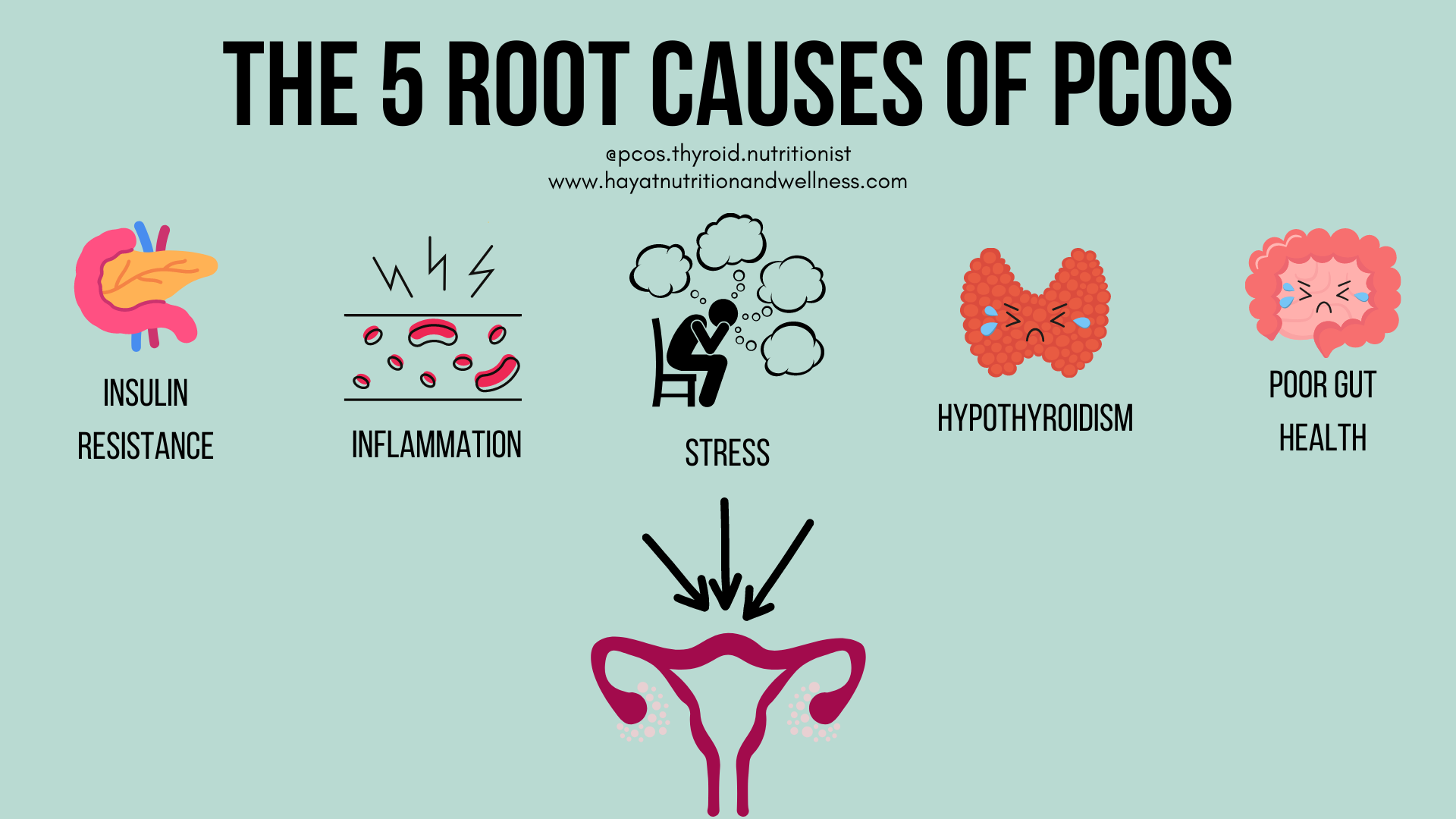While we know that PCOS is a metabolic condition that impacts the reproductive system, there is no consensus on what causes it. Underneath all the symptoms that get categorized as PCOS, there is a complex picture where hormones intersect with poor gut health, stress, inflammation, and more. By understanding the root causes of PCOS, it becomes easier to focus on the correct problem and better manage symptoms.

Root Cause #1 – Insulin Resistance
Insulin is naturally produced in your body to help regulate your blood sugar levels, which controls how much energy you have. 70-80% of women with PCOS have insulin resistance. Symptoms of insulin resistance include sugar cravings, skin tags, inability to lose weight, dark velvety patches, facial hair, etc. You can learn more about insulin resistance HERE.
Root Cause #2 – Chronic Stress
We often think about stress as something that’s external–our finances, family, or social life. But stress from the body’s perspective is as simple as too much demand and not enough resources.
Stress experienced by the body in controlled environments can be healthy. An example of this is exercise. During exercise, we push beyond our comfort zone to lift more weight, run in less time, etc. In the right amounts, exercise can be a stress our body is able to manage properly.
However, many people are chronically stressed–every day of every week of every month. Which means their stress hormones are constantly high. When the body is constantly flooded with stress hormones, it can cause high blood sugar, high blood pressure, lower immune function, among other things. It’s like battery saver mode on your phone – your body is doing its best to survive.
For those with PCOS, this means fatigue, intolerable PMS symptoms, increased facial hair, a missing period or a prolonged period, etc.
I talk in depth about how stress affects our health HERE.
Root Cause #3 – Poor Gut Health
Our intestines contain farms of bacteria. The human body has created a mutually beneficial relationship with these bugs overtime. Many of the by-products that are produced by bacteria are used directly by our body. These include vitamin K, B vitamins, and short-chain fatty acids (like acetic acid, butyric acid, etc).
Unfortunately, many environmental factors in the modern world (yet again!) create an imbalance in the good and bad bacteria in our gut (referred to as gut dysbiosis) and cause intestinal inflammation. Which then causes widespread inflammation in our body. Gut dysbiosis has not only been linked to conditions like irritable bowel syndrome (IBS) or SIBO, but also obesity, depression, anxiety, and diabetes.
Research is beginning to show that gut health may also play a significant role in the development of PCOS and is therefore, an important piece of the puzzle when trying to reverse it.
Those with PCOS have:
- Higher gut dysbiosis
- Lower microbiota diversity
- Lower microbial species in general
- Lower levels of beneficial bacteria
- And significantly higher levels of bad bacteria
Root Cause #4 – Undiagnosed Hypothyroidism
Many symptoms of PCOS overlap with hypothyroidism, including:
- Low basal body temperature
- No ovulation
- Irregular or no period
- Insulin resistance
- Weight gain or inability to lose weight
- Gut problems
5-10% of women with PCOS have subclinical hypothyroidism. Subclinical hypothyroidism (SCH) is seen as a milder form of hypothyroidism. Usually, someone with SCH will have high levels of thyroid stimulating hormone (TSH), but normal levels of T4 (a type of thyroid hormone). 80% of individuals with SCH also have anti-thyroid antibodies.
In women with PCOS, SCH can show up as sub-fertility and adverse pregnancy outcomes, combined with clinical symptoms of hypothyroidism. Or symptoms of hypothyroidism but normal labs. Hypothyroidism and PCOS are intricately linked, and even when labs don’t show disturbed thyroid function, symptoms can 1000% point to low thyroid.
When compared to those with PCOS and normal thyroid function, those with PCOS and SCH had higher weight, BMI, insulin levels, and TSH.
We also know that hypothyroidism is an underlying cause of insulin resistance, which is present in 70-90% of women with PCOS.
Hypothyroidism should be one of the first conditions ruled out BEFORE a PCOS diagnosis.
You simply cannot manage PCOS without optimizing thyroid function. And oftentimes, that means seeking out an endocrinologist who will take your SYMPTOMS seriously instead of just looking at your labs.
Root Cause #4 – Inflammation
Inflammation is the body’s natural response to an injury, infection, or disease to promote healing. However, it becomes harmful when it’s chronic or constantly on. The immune system is pumping out white blood cells and chemical messengers that keep inflammation turned on. This might lead to white blood cells to attack healthy tissue and organs and lead to autoimmune problems.
Chronic inflammation is linked to PCOS, Hashimoto’s, cancer, diabetes, cardiovascular disease, autoimmune diseases, and others.
Some signs of inflammation include:
- Body pain
- Chronic fatigue
- Insomnia
- Depression, anxiety, or mood disorders
- Gut problems
- Weight gain or weight loss
- Frequent infections or getting sick easily
- Insulin resistance
Summary
The 5 root causes of PCOS are: insulin resistance, chronic stress, poor gut health, inflammation, and undiagnosed hypothyroidism.
Do you need support in navigating PCOS? Check out my guide, “I (may) have PCOS, now what?” HERE.
- Understand PCOS Sugar Cravings & How to Stop Them - March 24, 2023
- The 4 Types of PCOS – What You Need to Know - February 24, 2023
- 4 Reasons Not to Keto with Hypothyroidism - January 27, 2023
